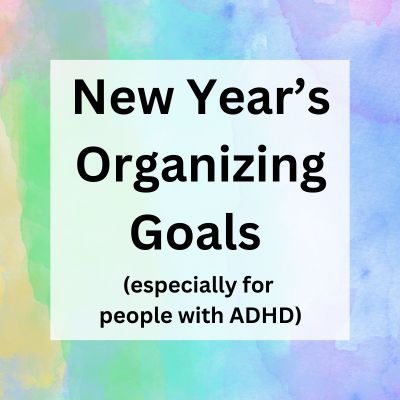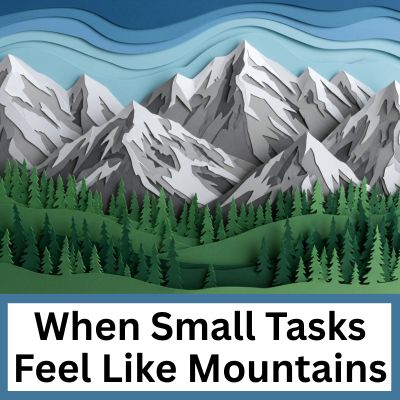New Year’s Organizing Goals (especially for people with ADHD)

I was recently being interviewed by a college student who was writing her first article for Dorm Therapy. She wanted help organizing her mini fridge and food storage area. I could see that she already had good ideas about what to do, and she had a genuine interest in organization. She has beautiful design sense, and utilized rolling carts to store her things so that she could move them when necessary. I taught her some tips on maximizing her vertical space. I recommended storing things she didn’t need to access very often in less valuable real-estate. I gave her advice on how to consolidate items so they took up less space and so she could more easily see what she had. We talked about tips to give other students so they could learn to wrangle their dorm rooms more efficiently.
As she was pressing me for more specific tips on how to organize, I was thinking back to my college and grad school days, and was thinking about what I liked to eat in school. As a freshman in college, I was vegan. This was back in 1999, before it was really mainstream. I was thinking about the delicious baked tofu I would hoard in my mini fridge, the textured vegetable protein I would add to pasta sauce, and the seriously amazing vegan Chinese food I would get on South Street in Philadelphia. Having leftovers of that in my dorm room was a true luxury. Although I knew I had ADHD when I was in college, I really hadn’t done anything about it. By the time grad school had hit, I had revamped my diet. I learned that high-carb foods affected me in such a way that I could not concentrate, and would negatively affect my mood and self-esteem. They would make me feel good while I was eating them, but I would immediately crash and get really tired. No wonder I worshipped so much protein as a vegan. In grad school, I made sure to load up on healthy low-carb foods such as tuna and nuts. I learned to cook foods that I could portion out so I could have them for quick meals, such as chicken soup (I always make my own bone broth) and meatloaf. I learned the importance of adding veggies to my meals. Sure, I loved to get ice cream and pizza once in a while, but my staples were very healthy.
While on FaceTime with my lovely college-student author, I couldn’t help but share tips on recommending quick, nourishing food options, like tuna and nuts, to help her busy fellow college students stay well-fed and organized. Getting a good balance of healthy fat, protein, and healthy carbs is excellent brain food. This will help people have better focus, improved mood, and more lasting energy. Focus, improved mood, and lasting energy are all necessary for getting good grades, and they’re necessary for being more organized.
In my blog, I like to give both practical organizing tips and tips to support the mind and body so people will have the physical and mental stamina to carry out the practical organizing tips. I just wrote a practical New Year’s Decluttering post on my other website, so here I wanted to talk about organizing goals to support the mind and body.
The four basic areas that need to be in balance for you to feel your best are:
- Sleep
- Hydration
- Food
- Movement
When one of these areas is out of out of balance, you might be able to function, but you’re not going to be able to be the best version of yourself. People with ADHD are often also highly sensitive people who are even more at risk of getting bumped off balance if these four areas aren’t being attended to. If you’re having trouble getting organized, look to see if any of these areas are out of balance. It’s really hard (almost impossible) to be organized if you’re not taking care of your brain and body. Little hinges swing big doors, so I recommend picking one of these areas to focus on, and taking yourself to the next level.
Sleep: While 7-9 hours is the average recommended time to sleep per night, I know some people really don’t need that much, and some people need more. I love to use my Oura Ring to measure exactly how many hours I am asleep per night. When I see I’ve been asleep for anything less than 7 hours, I notice that I’m more likely to get agitated, jittery, and impatient. Sleep is not a luxury. It’s a necessity.
Hydration: The recommended amount of water to drink per day varies based on your activity level, the weather/altitude, and other health conditions you’ve got going on. Drinking ½ your body weight in ounces throughout the day is the standard recommendation. For example, if you weigh 150 pounds, ideally you would be drinking 75 ounces of water (or non-caffeinated, non-sweetened beverages such as herbal tea, water with a little spritz of lemon juice, or electrolytes made with clean ingredients). Be sure to space it out so you’re not drinking it all at once, or drinking it all right before you go to bed.
Food: This is going to be different for everyone, based on personal dietary needs. Personally, I am a big fan of the Whole 30 Diet to help reset cravings and retrain taste buds. This is a 30 day reset diet that focuses on vegetables, fruit, healthy meats, healthy fats, nuts and seeds. You can achieve a good balance of healthy protein, carbs, and fats, while feeling nourished and centered. I don’t eat this way all the time, but this diet helps remind me of how good I can feel when I eat right. In general, I try to eat as healthy as possible by eliminating dairy, gluten, corn, and refined sugar, because I know these foods are incompatible with me, but I do eat them from time to time.
Movement: I’m lucky enough to have a live-in personal trainer (my Jack Russell). I take him on walks daily, go to the gym a couple times a week, and stretch on a daily basis. Regular physical activity will help you live a longer, healthier, and more fulfilling and organized life. Improving your cardiovascular health will help strengthen your heart, improve circulation, reduce the risk of heart disease and other chronic diseases, stroke, and high blood pressure. Exercising your respiratory system will support your lungs and oxygenate your body. Moving your body will help you manage your weight, build stronger muscles, and stronger bones. The mental health benefits are huge! You will reduce stress, anxiety, and depression because endorphins get released while you exercise. Your memory, focus, and overall cognitive function will improve because you are increasing blood flow to the brain. You’ll increase your energy level, reduce fatigue, have better sleep, and boost your immune system. With all that said, it is possible to over-do it too!
Rather than picking a huge goal and trying to do everything all at once, I recommend picking a small and achievable goal to work on. For example, if you’re only getting four hours of sleep per night, try adding one hour per night. If you’re drinking only coffee and energy drinks, try drinking one glass of water per day. If you’re only eating a bunch of junk food, try to sneak in one servings of vegetables per day. Or one piece of fruit. If you’re fairly sedentary, try just taking a walk around the block. Once you master your small goal, and you feel ready, take it a notch farther. Build on your successes. Establish credibility with yourself. Feel how good it feels to make progress. And don’t forget to smile!
I’m wishing you all a very happy, healthy, and organized 2025!

Posted By Jean Prominski, Certified Professional Organizer
- Follow me on Instagram @seattlesparkle
- Join my Facebook Group, Declutter and Organize with Seattle Sparkle.
- Ready to book a consultation? Complete this form.




